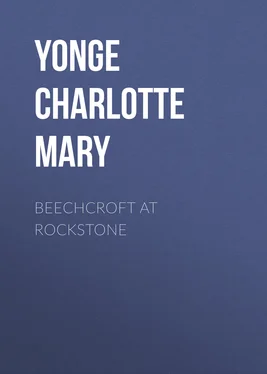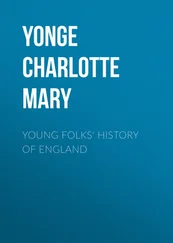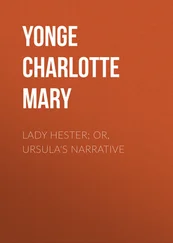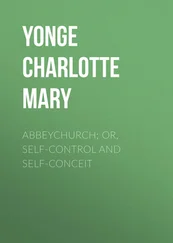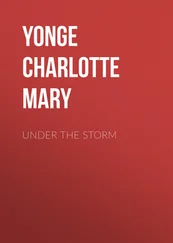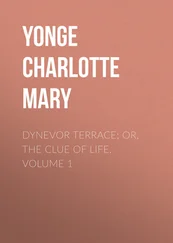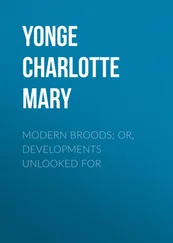Charlotte Yonge - Beechcroft at Rockstone
Здесь есть возможность читать онлайн «Charlotte Yonge - Beechcroft at Rockstone» — ознакомительный отрывок электронной книги совершенно бесплатно, а после прочтения отрывка купить полную версию. В некоторых случаях можно слушать аудио, скачать через торрент в формате fb2 и присутствует краткое содержание. Жанр: Альтернативная история, literature_19, Европейская старинная литература, foreign_antique, foreign_prose, Исторические приключения, на английском языке. Описание произведения, (предисловие) а так же отзывы посетителей доступны на портале библиотеки ЛибКат.
- Название:Beechcroft at Rockstone
- Автор:
- Жанр:
- Год:неизвестен
- ISBN:нет данных
- Рейтинг книги:4 / 5. Голосов: 1
-
Избранное:Добавить в избранное
- Отзывы:
-
Ваша оценка:
- 80
- 1
- 2
- 3
- 4
- 5
Beechcroft at Rockstone: краткое содержание, описание и аннотация
Предлагаем к чтению аннотацию, описание, краткое содержание или предисловие (зависит от того, что написал сам автор книги «Beechcroft at Rockstone»). Если вы не нашли необходимую информацию о книге — напишите в комментариях, мы постараемся отыскать её.
Beechcroft at Rockstone — читать онлайн ознакомительный отрывок
Ниже представлен текст книги, разбитый по страницам. Система сохранения места последней прочитанной страницы, позволяет с удобством читать онлайн бесплатно книгу «Beechcroft at Rockstone», без необходимости каждый раз заново искать на чём Вы остановились. Поставьте закладку, и сможете в любой момент перейти на страницу, на которой закончили чтение.
Интервал:
Закладка:
‘Shuttlecock yourself then!’ angrily responded Fergus, while both aunt and sister were laughing too much to interfere.
‘I shall call you a little Uncle Maurice instead,’ said Aunt Jane. ‘How things come round! Perhaps you would not believe, Gill, that Aunt Ada was once in a scrape, when she was our Mrs. Malaprop, for applying that same epithet on hearsay to Maurice.’
This laugh made Gillian feel more at home with her aunt, and they went up happily together for the introduction to the lumber-room, not a very spacious place, and with a window leading out to the leads. Aunt Jane proceeded to put the children on their word of honour not to attempt to make an exit thereby, which Gillian thought unnecessary, since this pair were not enterprising.
The evening went off happily. Aunt Jane produced one of the old games which had been played at the elder Beechcroft, and had a certain historic character in the eyes of the young people. It was one of those variations of the Game of the Goose that were once held to be improving, and their mother had often told them how the family had agreed to prove whether honesty is really the best policy, and how it had been agreed that all should cheat as desperately as possible, except ‘honest Phyl,’ who couldn’t ; and how, by some extraordinary combination, good for their morals, she actually was the winner. It was immensely interesting to see the identical much-worn sheet of dilapidated pictures with the padlock, almost close to the goal, sending the counter back almost to the beginning in search of the key. Still more interesting was the imitation, in very wonderful drawing, devised by mamma, of the career of a true knight—from pagedom upwards—in pale watery Prussian-blue armour, a crimson scarf, vermilion plume, gamboge spurs, and very peculiar arms and legs. But, as Valetta observed, it must have been much more interesting to draw such things as that than stupid freehand lines and twists with no sense at all in them.
Aunt Ada, being subject to asthmatic nights, never came down to breakfast, and, indeed, it was at an hour that Gillian thought fearfully early; but her Aunt Jane was used to making every hour of the day available, and later rising would have prevented the two children from being in time for the schools, to which they were to go on the Monday. Some of Aunt Jane’s many occupations on Saturday consisted in arranging with the two heads of their respective schools, and likewise for the mathematical class Gillian was to join at the High School two mornings in the week, and for her lessons on the organ, which were to be at St. Andrew’s Church. Somehow Gillian felt as if she were as entirely in her aunt’s hands as Kunz and the Sofy had been!
After the early dinner, which suited the invalid’s health, Aunt Jane said she would take Valetta and Fergus to go down to the beach with the little Varleys, while she went to her district, leaving Gillian to read to Aunt Ada for half an hour, and then to walk with her for a quiet turn on the beach.
It was an amusing article in a review that Gillian was set to read, and she did it so pleasantly that her aunt declared that she looked forward to many such afternoon pastimes, and then, by an easier way than the hundred and a half steps, they proceeded down the hill, the aunt explaining a great deal to the niece in a manner very gratifying to a girl beginning to be admitted to an equality with grown-up people.
‘There is our old church,’ said Aunt Ada, as they had a glimpse of a gray tower with a curious dumpy steeple.
‘Do you go to church there!’
‘I do—always. I could not undertake the hill on Sundays; but Jane takes the school-children to the St. Andrew’s service in the afternoon.’
‘But which is the parish church?’
‘In point of fact, my dear; it is all one parish. Good morning, Mr. Hablot. My niece, Miss Gillian Merrifield. Yes, my sister is come home. I think she will be at the High School. He is the vicar of St. Andrew’s,’ as the clergyman went off in the direction of the steps.
‘I thought you said it was all one parish.’
‘St. Andrew’s is only a district. Ah, it was all before your time, my dear.’
‘I know dear Uncle Claude was the clergyman here, and got St. Andrew’s built.’
‘Yes, my dear. It was the great work and thought with him and Lord Rotherwood in those days that look so bright now,’ said Aunt Ada. ‘Yes, and with us all.’
‘Do tell me all about it,’ entreated Gillian; and her aunt, nothing loth, went on.
‘Dear Claude was only five-and-twenty when he had the living. Nobody would take it, it was such a neglected place. All Rockquay down there had grown up with only the old church, and nobody going to it. It was a great deal through Rotherwood. Some property here came to him, and he was shocked at the state of things. Then we all thought the climate might be good for dear Claude, and Jane came to live with him and help him, and look after him. You see there were a great many of us, and Jane—well, she didn’t quite get on with Alethea, and Claude thought she wanted a sphere of her own, and that is the way she comes to have more influence than any one else here. And as I am always better in this air than anywhere else, I came soon after—even before my dear fathers death. And oh! what an eager, hopeful time it was, setting everything going, and making St. Andrew’s all we could wish! We were obliged to be cautious at the old church, you know, because of not alarming the old-fashioned people. And so we are still—’
‘Is that St. Andrew’s? Oh, it is beautiful. May I look in?’
‘Not now, my dear. You will see it another time.’
‘I wish it were our church.’
‘You will find the convenience of having one so near. And our services are very nice with our present rector, Mr. Ellesmere, an excellent active man, but his wife is such an invalid that all the work falls on Jane. I am so glad you are here to help her a little. St. Andrew’s has a separate district, and Mr. Hablot is the vicar; but as it is very poor, we keep the charities all in one. Rotherwood built splendid schools, so we only have an infant school for the Rockstone children. On Sunday, Jane assembles the older children there and takes them to church; but in the afternoon they all go to the National Schools, and then to a children’s service at St. Andrew’s. She gets on so well with Mr. Hablot—he was dear Claude’s curate, you see, and little Mrs. Hablot was quite a pupil of ours. What do you think little Gerald Hablot said—he is only five—“Isn’t Miss Mohun the most consultedest woman in Rockquay?”’
‘I suppose it is true,’ said Gillian, laughing, but rather awestruck.
‘I declare it makes me quite giddy to count up all she has on her hands. Nobody can do anything without her. There are so few permanent inhabitants, and when people begin good works, they go away, or marry, or grow tired, and then we can’t let them drop!’
‘Oh! what’s that pretty spire, on the rise of the other hill?’
‘My dear, that was the Kennel Mission Chapel, a horrid little hideous iron thing, but Lady Flight mistook and called it St. Kenelm’s, and St. Kenelm’s it will be to the end of the chapter.’ And as she exchanged bows with a personage in a carriage, ‘There she is, my dear.’
‘Who? Did she build that church?’
‘It is not consecrated. It really is only a mission chapel, and he is nothing but a curate of Mr. Hablot’s,’ said Aunt Ada, Gillian thought a little venomously.
She asked, ‘Who?’
‘The Reverend Augustine Flight, my dear. I ought not to say anything against them, I am sure, for they mean to be very good; but she is some City man’s widow, and he is an only son, and they have more money than their brains can carry. They have made that little place very beautiful, quite oppressed with ornament—City taste, you know, and they have all manner of odd doings there, which Mr. Hablot allows, because he says he does not like to crush zeal, and he thinks interference would do more harm than good. Jane thinks he ought not to stand so much, but—’
Читать дальшеИнтервал:
Закладка:
Похожие книги на «Beechcroft at Rockstone»
Представляем Вашему вниманию похожие книги на «Beechcroft at Rockstone» списком для выбора. Мы отобрали схожую по названию и смыслу литературу в надежде предоставить читателям больше вариантов отыскать новые, интересные, ещё непрочитанные произведения.
Обсуждение, отзывы о книге «Beechcroft at Rockstone» и просто собственные мнения читателей. Оставьте ваши комментарии, напишите, что Вы думаете о произведении, его смысле или главных героях. Укажите что конкретно понравилось, а что нет, и почему Вы так считаете.
